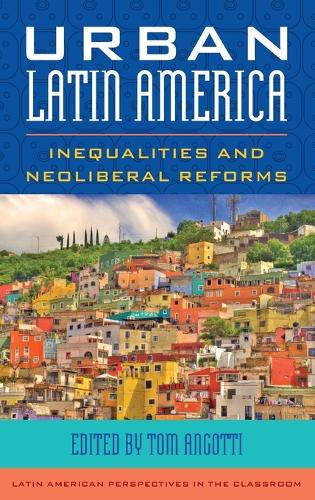
Urban Latin America: Inequalities and Neoliberal Reforms
(Hardback)
Available Formats
Publishing Details
Urban Latin America: Inequalities and Neoliberal Reforms
By (Author) Tom Angotti
Bloomsbury Publishing PLC
Rowman & Littlefield Publishers
25th August 2017
United States
Classifications
Tertiary Education
Non Fiction
City and town planning: architectural aspects
Politics and government
307.76098
Physical Properties
Hardback
306
Width 156mm, Height 239mm, Spine 23mm
540g
Description
Latin America is one of the most urbanized regions of the world. To understand Latin America today it is important to trace the origins and characteristics of the urban-rural divide, inequalities within urban areas, and the prospects for change. This is particularly important and timely given the challenges of widening environmental and social disparities, climate change, and climate justice. The authors critically analyze urban issues within the context of the national and regional political economy, neoliberal governance, and urban social movements. Latin Americas cities are sharply divided into wealthy enclaves and large peripheral areas, reflecting deep social and economic inequalities, leading to notable movements and reforms. This text explores Latin American cities, their history, similarities and differences, and current problems.
Reviews
By most measures, Mexico City and So Paulo are two of the 10 largest cities in the world; the regional population in each is over 20 million people. With the global population rapidly expanding and living in urban areas, and with almost all projected megacities located in Latin America, Asia, and Africa, it would be prudent to have a better understanding of how cities develop and what impact neoliberal policies and growing inequalities have on urban society. This collection of 16 essays uncovers the inner workings of Latin American cities, provides a look at political processes and forms of resistance, brings to life the people who inhabit these cities, and presents readers with alternative narratives to traditional urban development as it has come to be understood in North America. By exploring alternatives to markets; by outlining forms of community control, budgeting, and opposition to neoliberal policies; and by celebrating the occupants of cities through the rejection of stereotypes like marginal and informal, Angottis volume takes its place as an important addition to literature on urbanization globally. Summing Up: Highly recommended. Upper-division undergraduates and above. * CHOICE *
This text provides an excellent, coherent, and timely overview of Latin American urban development issues. The book places Latin America in its global context and profiles a broad range of projects, cities, and countries. The contributions are all original and thought-provoking, including such rarely considered but important topics as participatory budgeting, place marketing, housing cooperatives, environmental contamination, public-private partnerships, and the many claims on rights to the city. -- Ray Bromley, State University of New York at Albany
This important text makes an invaluable contribution to theory and practice on three fronts: (1) it advances relational, integrative, and comparative perspectives and methodological approaches to understanding urban Latin America in a neoliberal globalizing context; (2) it provides a deep critique of many crucial concepts, including urban peripheries, human rights, best practices, and informality; and (3) it outlines a forward-looking, countervailing perspective based on promising cases that have the potential to radically challenge neoliberalism in ways that may reduce inequality and strengthen democracy. -- Keith Pezzoli, University of California, San Diego
This powerful text offers a much-needed critical overview of Latin Americas unique urban conditionsaffected by social uprisings, anti-capitalist movements, left politics, struggles for rights, and environmental confrontations. It is a masterfully curated collection of essays that not only addresses core development moments but crafts both a hopeful and dire version of what the future can look like for the more than 600 million inhabitants of the region, as well as its potential influence on the world at large. For many of us who see Latin America as the territory closest to the possibility of emancipatory and socially just forms of urbanization, this book is a great guide for the ongoing struggle. -- Miguel Robles-Durn, The New School
Author Bio
Tom Angotti is professor emeritus of urban policy and planning at Hunter College and the graduate center, City University of New York.
